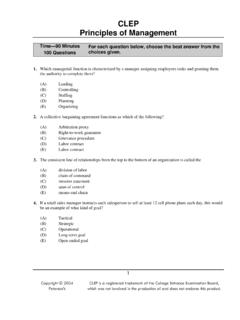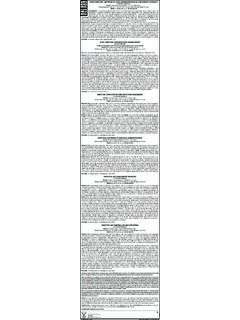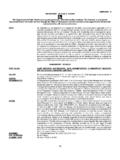Transcription of LEGAL AND INSTITUTIONAL FRAMEWORK FOR E …
1 1 LEGAL AND INSTITUTIONAL FRAMEWORK FOR E- commerce IN NIGERIA1 Financial Institutions have applied technology to their payment services in a variety of ways. Automated Data Processing, computers and Telecommunication systems have made Electronic Banking a reality 2 INTRODUCTION With the advent of the Computer Age, it is common knowledge that the worldwide adoption of Information and Communication Technology (ICT) has immensely altered and enhanced human interaction and our way of life for the past three decades.
2 Thus, the world is now a global marketplace as a result of the application of Information and Communication Technology (ICT) in business. However, the emergence of Electronic commerce (e- commerce ) as a result of the development of the internet has brought with it a number of LEGAL and socio-economic issues. Since the law of every society ought to be a veritable tool for social engineering, this paper will attempt to give an overview of international e- commerce and its guiding principles as well as examine Nigerian legislation on the subject, the INSTITUTIONAL FRAMEWORK and the LEGAL issues and challenges encountered by the Nigerian LEGAL system in the regulation of e- commerce in Nigeria.
3 The paper would end with a few recommendations. This paper is intended merely to provoke discussion so nothing is cast in stone notwithstanding the conclusions and recommendations so that at the end we look forward to a lively discussion. WHAT IS E- commerce ? Electronic commerce commonly known as e- commerce or e-Business consists of buying and selling of products or services over electronic systems such as the internet and other computer It has also been defined as the exchange of information across electronic networks at any stage in the supply chain, whether within an organization, between businesses.
4 Between businesses and consumers or between the public and private sectors whether paid or E- commerce involves Electronic Funds Transfer (EFT), Supply Chain Management, Internet Marketing, Online Transaction processing, Electronic Data Interchange (EDI), Inventory Management Systems, and Automated Data Collection systems. 1 Being lead discussant paper delivered by Chief Anthony Idigbe SAN on Wed. June 9, 2010 Bankers House, PC 19 Adeola Hopewell St.
5 , V/I, Lagos This paper was prepared with the assistance of Nnamdi Oragwu (Partner) & Okorie Kalu Esq (Senior Associate) PUNUKA Attorneys & Solicitors Lagos Nigeria 2 Budnit, M., The Finicky Computer, The Paperless Telex and The Fallible Swiss: Bank Technology and the Law , (1984) Vol. XXV No. 2 Boston College Law Review, 259 3 4 United Kingdom Cabinet office, 1999 2 It is important to understand that the scope of e- commerce is wide as all electronically mediated transactions fall under its ambit.
6 In other words, it is not restricted solely to the buying and selling of products, but includes pre-sale and post-sale The objectives of e- commerce are numerous as it: 1. Facilitates international co-operation through trade 2. Makes goods and services available to consumers all over the world. 3. Expands the consumer/customer base for manufacturers and producers and goods and services 4. Increases the speed of delivery of goods and services to customers. General overview of Electronic commerce internationally and guiding principles Internationally, the development of e- commerce led to the following realization: with the development of Information technologies as alternatives to paper based businesses, new types of contracts and new types of goods were created, to wit, virtual goods, digital contracts, on-line transactions.
7 Certain things lost their relevance, such as the medium of the transaction or the geographic location of the parties. However, the essence of those businesses remained the same (ordering and paying whether online or offline. But businesses need confidence and trust in trading electronically. They need to be certain that transmitted orders or invoices have not been altered, and that they are from whom they appear to be from. They need to be able to trust that others cannot access confidential or personal information.)
8 The lack of the usual and traditional physical medium used for off line transactions in online transactions therefore required adaptation of the existing LEGAL FRAMEWORK to avoid the LEGAL hurdles of having to satisfy the requirements of LEGAL concepts that were based on tangible medium and geographic location such as signature , instrument document , receipt , delivery , etc. Rather new concepts such as data messages, digital signatures, authentication etc come into play with a view of giving online transactions the requisite certainty that is needed for business to thrive.
9 In an electronic environment, the original of a message is indistinguishable from a copy, bears no handwritten signature, and is not on paper. The potential for fraud is considerable, due to the ease of intercepting and altering information in electronic form without detection, and the speed of processing multiple transactions. The evidentiary issue arising as to admissibility of electronic data or information as evidence has also been to a certain extent a Chinese conundrum especially having regard to the fact that it is difficult to determine what is an original electronic document and what is a copy; when 5 Kalakota and Whinston, Electronic commerce , 69 3 the nature of the evidence itself is ethereal.
10 The purpose of various techniques currently available on the market or still under development is to offer the technical means by which some or all of the functions identified as characteristic of handwritten signatures can be performed in an electronic environment. Such techniques may be referred to broadly as electronic signatures . The international LEGAL FRAMEWORK under the UNITED NATIONS Commission on International Trade Law (Uncitral) Accordingly, with these considerations in mind, by 1996 the UNCITRAL Model law on E- commerce was adopted at the UN level and in 2001, the UNCITRAL Model Law on e-signatures was also adopted.







